AIG, Prudential Financial, and GE Capital aren’t “banks” in a traditional sense. But the Financial Stability Oversight Council has made a preliminary determination that they should be considered “systemically important financial institutions” in the sense of the Dodd-Frank bill and thus subject to heightened financial scrutiny.
This is, I think, an underrated aspect of Dodd-Frank vis-a-vis some other financial regulatory approaches that seem appealingly simple. The idea here is that even though these institutions aren’t banks, a catastrophic failure of any one of them would pose severe risks to the banking system. AIG is the clear precedent here. Banks were counting on AIG being able to make good on its insurance contracts in order to keep their own balance sheets solvent. But AIG screwed up and mispriced its own insurance contracts. So had AIG failed, it would have been unable to pay banks everything they were owed. And had banks been unable to collect, they would have failed as well. So the federal government ended up needing to shoulder AIG’s financial obligations. The idea is that an institution in that role should be regulated in advance in light of its heightened importance to the overall financial system. An approach that focused exclusively on bank size or bank leverage could end up ignoring the possibility of offloading bank risk to non-bank institutions, which would be particularly unfortunate since that exact thing already happened in the case of AIG.
This SIFI designation should probably be considered an important part of the backdrop for why Jeffrey Immelt wants to spin most of GE Capital off from the rest of the company. For a while GE Capital was the main money-maker for the company. But that in part reflected an arbitrage play in which being the financing arm of an industrial company was a very advantageous classification. The FSOC’s ability to say, “well you may not be a bank but you’re a giant financial institution so we’re going to regulate you like one anyway” makes the whole operation considerably less lucrative.
